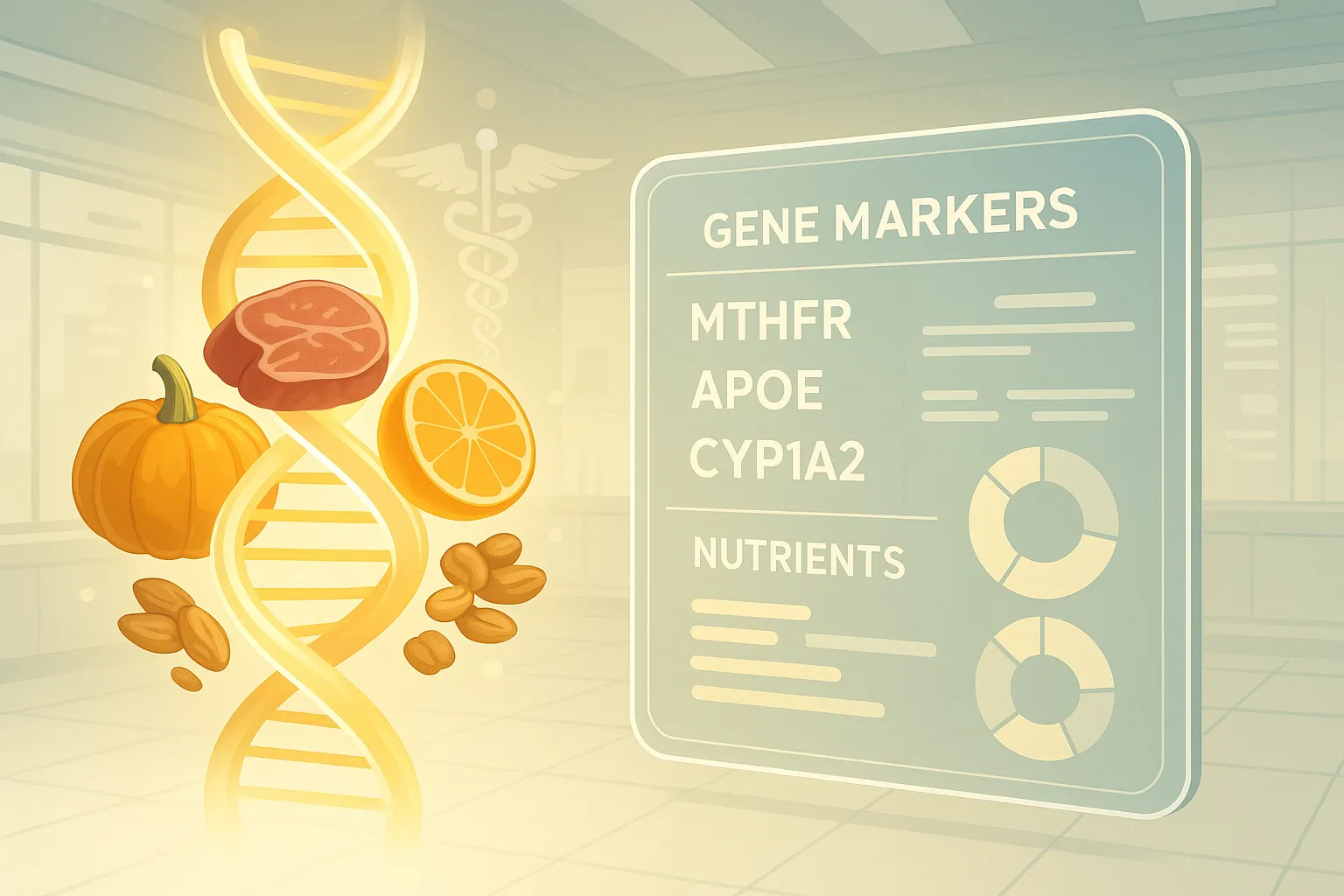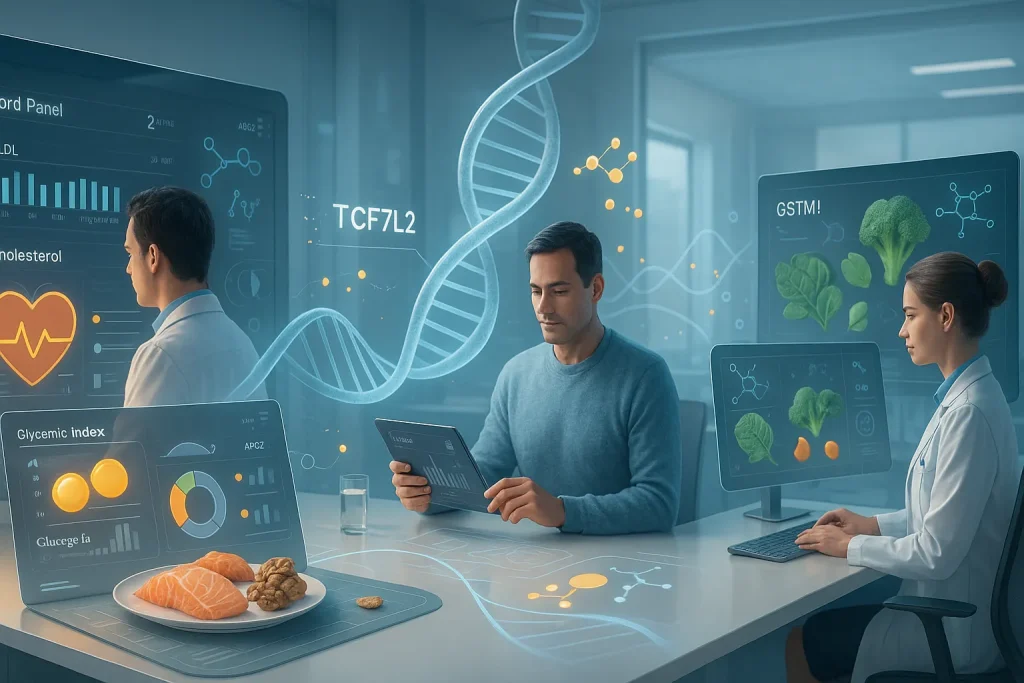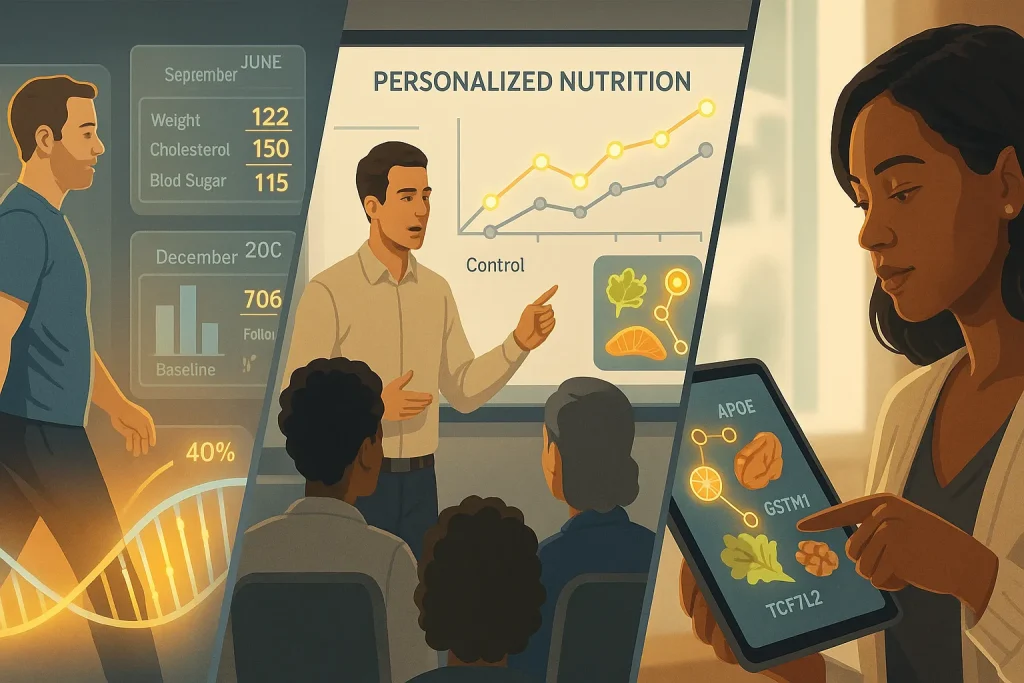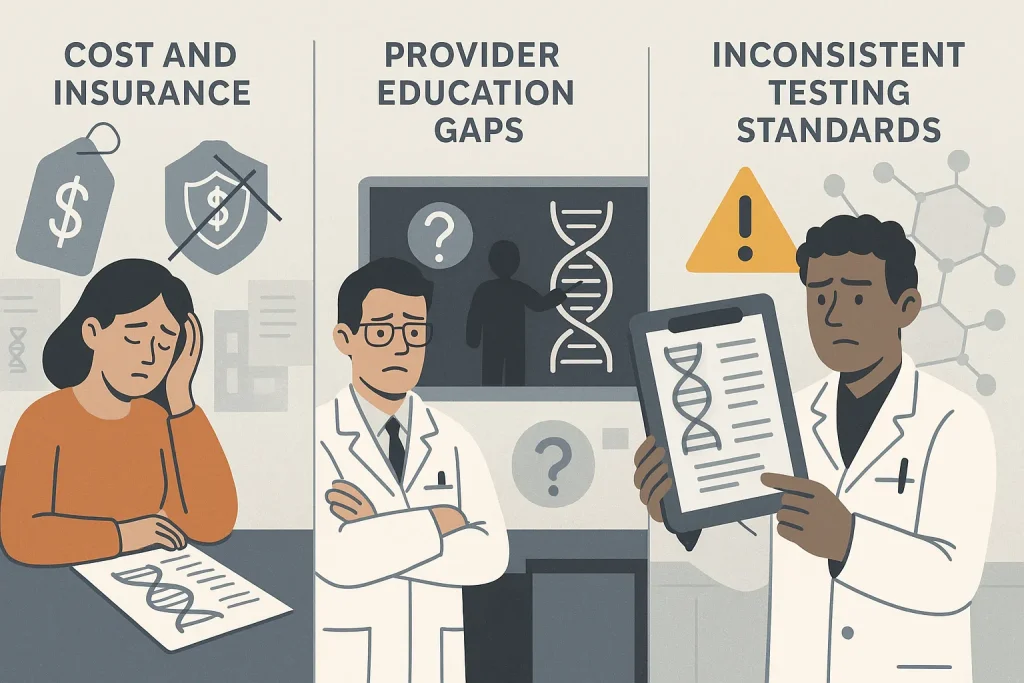
Nutrigenomics in precision medicine is changing the way we approach health by connecting your genetic blueprint with the food you eat. Imagine if your DNA could hold the secret to your perfect diet, helping you prevent chronic illnesses like diabetes or heart conditions. Sounds like science fiction, right? However, that’s precisely what nutrigenomics—a groundbreaking field that combines nutrition and genetics—aims to achieve. By understanding how your genes interact with the food you eat, this innovative approach is reshaping the way we think about health and wellness.
At its core, nutrigenomics is about precision. It’s not a one-size-fits-all solution, but a deeply personalized approach to addressing health challenges at their root. With chronic conditions on the rise, the idea of tailoring nutrition to fit your unique genetic blueprint feels necessary. Could this be the future of pharmacogenomics and medicine? Stick around to discover how nutrigenomics is revealing new possibilities for healthier, longer lives—starting with you.
Key Takeaways
Nutrigenomics combines nutrition and genetics to create personalized health solutions, tailoring diets to an individual’s unique genetic profile.
This precision approach helps manage chronic health conditions like cardiovascular disease, diabetes, and obesity through nutrition aligned with genetic variations.
Key genes, like MTHFR, APOE, and CYP1A2, play crucial roles in nutrient metabolism, cardiovascular health, and sensitivity to substances like caffeine.
Advanced genetic testing methods, from direct-to-consumer kits to clinical lab analyses, allow healthcare providers to design science-backed nutrition plans.
Nutrigenomics offers groundbreaking applications such as macronutrient optimization, micronutrient supplementation, and meal timing based on a person’s unique DNA.
Table of Contents
Understanding Nutrigenomics: The Foundation of Personalized Nutrition Medicine
Ever wonder why that trendy diet works wonders for your best friend but leaves you feeling like a tired, hungry shell of yourself? That’s where nutrigenomics steps in—a mouthful of a term that’s shaking up personalized medicine by focusing on how your unique genetic makeup interacts with what you eat.
Understanding Nutrigenomics and Its Importance
Nutrigenomics deciphers how your DNA interacts with food, tailoring health solutions based on your unique genetic makeup. It moves past generic advice and helps address conditions like diabetes, obesity, and heart disease by understanding how your body reacts to specific foods.
For healthcare providers, it enables personalized, science-based guidance, enhancing precision in treatment.
The Impact of Genetic Variations on Nutrition
Genes heavily influence how nutrients are processed. Some genetic differences can hinder vitamin absorption, increase sensitivity to salt, or affect caffeine metabolism. Minor DNA changes, called SNPs, can cause variations like nutrient deficiencies or metabolic inefficiencies. Using tools like genetic testing, practitioners can deliver targeted, personalized health strategies.
Mapping Your Genetic Blueprint: Key Genes That Influence Nutritional Needs
Ever wonder why your friend swears by coffee while you’re left jittery after half a cup? Or why some people thrive on a low-fat diet while others don’t see a difference? It’s your genes pulling the strings behind the scenes. Let’s jump into three key genes that play a starring role in how your body handles nutrients.
MTHFR Gene and Folate Metabolism
The MTHFR gene controls how your body uses folate (vitamin B). Certain variants, like C677T, reduce its efficiency, possibly leading to high homocysteine levels, which can cause heart problems or birth defects. Eating leafy greens or taking methylfolate supplements (if recommended) can help.
APOE Gene and Cardiovascular Health
The APOE gene manages cholesterol and fat in your blood. If you have the APOE ε4 variant, your risk for heart issues and Alzheimer’s increases. To lower the risk, replace saturated fats with heart-healthy foods like olive oil, avocados, and nuts.
CYP1A2 Gene and Caffeine Sensitivity
The CYP1A2 gene influences how fast your body processes caffeine. Some variants make you a slow metabolizer, raising risks of hypertension with too much caffeine. Know your limits and choose options like matcha or decaf to avoid negative effects.
Your genes guide your health, but they don’t define it. Nutrigenomics helps you use genetic insights to create a personalized diet and healthier lifestyle.

Precision Medicine Applications: Tailoring Treatments Through Nutrigenomics
Imagine if your diet came with a customized manual, crafted just for your unique genetic makeup. That’s precisely what nutrigenomics brings to the table. By marrying genetics with nutrition, this approach enables healthcare practitioners to design personalized nutrition plans that are as unique as your body’s ultimate health code.
Cardiovascular Health
Your heart health goes beyond typical dietary advice—it’s influenced by your genes. Nutrigenomics pinpoints gene variants like APOE that affect cholesterol and inflammation, helping tailor diets. For example, reducing saturated fats or adding omega-3-rich fish can manage cholesterol and triglycerides. Personalized nutrition can improve heart health for those genetically at risk.
Diabetes Management
Blood sugar control is personal. Nutrigenomics examines genes like TCF7L2, linked to glucose metabolism and insulin sensitivity. This allows personalized diet plans, such as focusing on low glycemic foods or adjusting fiber intake, empowering better diabetes management and metabolic health.
Cancer Prevention
Your DNA can reveal how nutrition fights cancer. Genes affecting inflammation and detoxification, like GSTM1, highlight the need for antioxidant-rich foods or detox-supporting veggies like broccoli. Customized diets based on genetics can lower cancer risks with accuracy.
Advanced Testing Methods: How Nutrigenomics Assessment Works
Picture this: your DNA is like a complex instruction manual for your body, and nutrigenomics acts as a translator, helping you understand how your body responds to different foods. Advanced genetic testing methods unlock these secrets, enabling healthcare practitioners to translate genetics into personalized nutrition strategies.
Simplified Overview of Nutrigenomics in Precision Medicine
Direct-to-Consumer Genetic Testing
Mail-in DNA kits have made nutrigenomics widely accessible, offering basic health insights. However, these tests often lack depth, providing generic advice that may require professional interpretation for precise, personalized nutrition strategies.
Clinical Laboratory Analysis
Advanced clinical labs use high-tech tools like next-generation sequencing and genotyping to analyze specific genes affecting nutrition. These tests evaluate genetic variations (SNPs) to uncover detailed insights, such as how genes impact cholesterol metabolism or nutrient absorption, enabling fully customized nutrition plans.
Interpreting Genetic Markers
Turning test results into actionable nutrition involves connecting genetic data to lifestyle. Practitioners personalize guidance to fit individual DNA and daily habits, creating tailored health plans that move beyond generic advice toward meaningful, practical solutions.
Personalized Nutrition Plans: Creating Customized Dietary Interventions
Imagine if your diet could be as unique as your fingerprint—crafted precisely to match your body’s needs. That’s exactly what nutrigenomics offers: a way to translate your genetic profile into actionable, personalized nutrition plans.
Gone are the days of generic “one-size-fits-all” diets; here’s what focusing on your unique biology can do:
Macronutrient Optimization Based on Genetic Profile
Your genes could be the secret ingredient to figuring out the perfect balance of carbs, fats, and proteins for your body. Some of us are built to thrive on low-carb diets, while others might feel like they’ve been hit by a bus without a solid dose of complex carbs in their meals.
Research indicates that specific gene variants can indicate how effectively your body metabolizes macronutrients. For instance, specific genetic markers might determine if you process fats efficiently or if you’re prone to insulin spikes after sugary foods.
By utilizing precision health genomics, you can adjust your meals to optimize energy and minimize health risks. For example, if your DNA flags you as someone sensitive to saturated fats, swapping that buttery croissant for avocado toast could do your heart—and waistline—a huge favor. Consider this approach your blueprint for achieving better energy levels and long-term health.
Micronutrient Supplementation Strategies
Have you ever noticed how some people can skip their multivitamins and seem fine, while others take supplements religiously just to stay afloat? Your body’s ability to absorb and use key vitamins and minerals—like vitamin D or zinc—can be highly influenced by your genetic makeup.
For instance, variations in the MTHFR gene can affect how your body processes folic acid, an essential vitamin tied to heart health. If this gene isn’t firing on all cylinders, a little extra folate in your diet could feel like plugging a leak in your wellness boat.
Micronutrient testing through genomics can highlight exactly what your body craves or struggles with. This kind of targeted supplementation isn’t just about filling in the gaps—it’s about future-proofing your health by preventing deficiencies before they cause issues. Think of it as giving your body the right tools for the job.
Meal Timing and Metabolic Considerations
Have you ever wondered why late-night snacks make you feel sluggish, or why someone else might eat like a night owl and seem unfazed? Your genes may hold the answer. Nutrigenomics research has uncovered links between genetic profiles and how your body responds to meal timing.
Some people’s metabolic processes are better suited for early breakfasts, while others may perform better with intermittent fasting or delayed eating windows.
With a bit of insight into your DNA, you can experiment with meal timing that syncs with your internal clock. Your body’s unique rhythm can guide your schedule to improve both energy and health markers.

Clinical Evidence: Research Supporting Nutrigenomics in Precision Medicine
Nutrigenomics is where cutting-edge science meets everyday health, offering insights that can revolutionize how you approach nutrition in your practice. Let’s explore what the research reveals about this groundbreaking field and its impact on lives.
Landmark Studies in Personalized Nutrition
Studies have uncovered fascinating links between your genes and your plate. For example, a systematic review found that personalized nutrition interventions—those tailored to an individual’s genetic profile—can improve diets and lower specific heart condition risks more effectively than generic advice. If you’ve ever felt like cookie-cutter meal plans just don’t cut it, the science now backs you up.
The food choices that work for one person may not work for another due to genetic interactions, and research confirms this. Mendelian randomization, a specialized technique in genetics, has been used to map how specific foods affect metabolic traits. The Food4Me trial, for instance, an extensive EU-funded study, highlighted the long-term benefits of personalizing nutrition. However, it also noted that phenotype data (such as weight or blood sugar) doesn’t always rely entirely on genotype to deliver results.
Success Stories from Clinical Trials
Clinical trials form the beating heart of nutrigenomics, showing how it’s already helping people. In one study, tailoring protein intake to participants’ genetic profiles improved muscle mass retention among aging adults. Imagine advising not just “Eat more protein” but specifying exactly the right amount based on DNA.
For chronic conditions like type 2 diabetes, nutrigenomic interventions have transformed care. Trials have shown that diets customized using genetic insights can help control blood sugar more effectively than one-size-fits-all approaches. Participants in these studies reported not only better lab results but also feeling more energetic and in control of their health, because the plans were tailored specifically to them.
One particularly successful application involved managing cardiovascular risks. Using nutrigenomics to identify specific gene-diet interactions—such as how the **APOE gene influences cholesterol metabolism—enabled the development of personalized diets that reduced inflammation and improved lipid markers. It’s personalization with real-life impact.
Long-term Health Outcomes Data
How about taking a step back and looking at the big picture? Long-term studies are revealing the significant impact of nutrigenomics on achieving sustained health benefits. Research aimed at linking genetic variants to positive metabolic effects of diets shows promising results. For example, studies tracking participants over several years have found that individualized plans help manage weight, blood pressure, and cholesterol more effectively than traditional recommendations.
Here’s a twist: while personalized diets have excelled in managing conditions like obesity, the evidence for consistently improving cardiovascular-related outcomes remains mixed. Why? Different trial methodologies and complexities in personalization mean there’s still more to learn. However, what truly stands out is how these approaches excel when targeting metabolic conditions and preventing future complications.
So, as a practitioner, when you think of introducing precision health genomics into your care plans, remember it’s more marathon than sprint. It’s about equipping your patients with science-backed, individualized strategies that they can stick to for the long haul.

Overcoming Implementation Challenges: Barriers to Widespread Adoption
Let’s break down the barriers that are slowing the rise of nutrigenomics to the forefront of precision medicine.
Key Challenges in Nutrigenomics for Precision Medicine
Cost and Insurance Barriers: Genetic tests and personalized nutrition plans are expensive, and most insurance companies don’t cover them. Public funding could make these services more affordable, while tiered plans offer a budget-friendly introduction to precision health solutions.
Provider Education Gaps: Less than 10% of doctors feel equipped to discuss genetic variants with patients. Training programs, like those from the Nutrigenomics Institute, can improve understanding and offer certifications to enhance professional skills.
Inconsistent Testing Standards: A lack of universal testing protocols leads to unreliable results and skepticism. Prioritizing labs with strong reputations and rigorous methods can ensure better accuracy until standardized frameworks are in place.
Collaboration among providers, researchers, and policymakers is crucial to overcome these issues and unlock nutrigenomics’ potential in personalized medicine.
Practical Applications: Getting Started with Nutrigenomics-Based Care
To help you begin, let’s break down into manageable steps, so you can confidently bring this cutting-edge science into your practice.
Finding Qualified Healthcare Providers
Start with professionals trained in nutrigenomics, as not everyone in healthcare is fluent in the language of genes. Look for registered dietitians, nutritionists, or doctors specializing in precision health genomics. Bonus points if they’ve worked with tools like Opus23 Explorer™ or handled comprehensive nutrigenomic reports.
Don’t be afraid to ask about their experience with genetic testing and individualized plans. A qualified provider should combine scientific rigor with a knack for explaining complex ideas in human terms (think of genes as recipes and nutrients as the ingredients). It’s like finding a tech-savvy chef for your body—worth the search!
Preparing for Genetic Testing
Think of genetic testing as the “kickoff” for nutrigenomics—it’s where the action starts, but you need to gear up first. Start by researching the types of tests available. Clinical-grade tests, such as those using next-generation sequencing, provide detailed insights but can be expensive. Direct-to-consumer kits are more affordable yet may lack depth. Decide what aligns best with your practice.
You’ll also want to consider the commitment. Results often lead to recommendations that can reshape a patient’s diet and lifestyle. Say, if they have a variant affecting caffeine metabolism, they might need to say goodbye to extra espressos. Prepare for those conversations—they’ll come with questions, and sometimes, resistance.
Budget wisely here, too. Many patients worry about costs, and if insurance doesn’t cover it, you might need strategies to keep testing accessible.
Implementing Personalized Nutrition Recommendations
Once you’ve got the genetic scoop, it’s time to tailor those nutrition plans like a bespoke suit. Gene insights make it possible to adjust macronutrients, tweak micronutrient intake, and even perfect meal-matching down to the timing. For example, if a patient has an MTHFR variant, you might suggest more folate-rich foods, such as spinach, or recommend supplements that provide methylated folate.
Make it an interactive journey. Utilize patient-friendly tools such as flowcharts, quizzes, or visual aids. What about a polished handout explaining why they should limit salt or carbs based on their genetic profile? People tend to stick to plans they understand.
And don’t forget regular check-ins. Nutrigenomics isn’t a one-and-done deal. Patients’ responses, lifestyle changes, and evolving health goals may necessitate adjustments to their plan over time. Think of it like tuning a guitar—minor adjustments make all the difference in harmony.
By following these steps, you’ll master the art of personalized nutrition for medicine, transforming raw genetic data into tangible, life-changing health outcomes. Now, wouldn’t that be something to brag about at your next conference?
Conclusion
Nutrigenomics is reshaping how you approach health by combining genetics and nutrition to create truly personalized care. It’s not just about eating right—it’s about eating right for your unique genetic makeup. This cutting-edge field offers an exciting path to better health, helping you manage chronic conditions and optimize your well-being in ways that generic diets simply can’t.
As technology advances, the potential for nutrigenomics will only grow, making it more accessible and practical. By embracing this personalized approach, you’re not just following a trend—you’re investing in a healthier, more informed future for yourself and those you care for.
Frequently Asked Questions
What is nutrigenomics?
Nutrigenomics is the scientific study of how individual genetic variations influence the way our bodies process nutrients from food. It enables the creation of personalized dietary solutions according to a person’s unique genetic makeup, optimizing health and preventing chronic illnesses.
How does nutrigenomics differ from traditional diets?
Unlike traditional diets that offer generalized advice, nutrigenomics utilizes genetic insights to develop highly personalized nutrition plans. This approach examines how specific genes influence nutrient absorption and metabolism to achieve targeted health benefits.
Can nutrigenomics help prevent chronic diseases?
Yes, nutrigenomics can help prevent chronic diseases, such as diabetes and heart conditions, by addressing genetic predispositions. It provides diet recommendations tailored to manage risks associated with specific gene variations.
What role does genetic testing play in the field of nutrigenomics?
Genetic testing is a foundational tool in nutrigenomics. It identifies genetic variations, such as single-nucleotide polymorphisms (SNPs), that affect nutrient metabolism. These insights are then used to create personalized nutrition plans.
Are genetic tests for nutrigenomics accurate?
Genetic tests for nutrigenomics are generally reliable when conducted by reputable laboratories using advanced techniques, such as next-generation sequencing. However, the accuracy depends on the quality and standardization of the testing process.
What kind of dietary changes can nutrigenomics suggest?
Nutrigenomics may recommend adjustments to macronutrient ratios (carbohydrates, fats, proteins), specific vitamin or mineral supplements, meal timing, or reduced intake of substances like caffeine or salt, based on genetic sensitivity.
Is nutrigenomics suitable for everyone?
Yes, nutrigenomics is suitable for anyone interested in understanding how their genes impact diet and health. It’s particularly beneficial for those managing chronic conditions or looking to improve their overall wellness.
Can nutrigenomics help with weight management?
Yes, nutrigenomics can guide weight management by uncovering genetic factors that influence metabolism, hunger, and fat storage. This allows for a tailored approach to achieving and maintaining a healthy weight.
What are some challenges to adopting nutrigenomics?
Challenges include the high cost of genetic testing, limited insurance coverage, lack of standardization in test results, and the need for more training among healthcare specialists in interpreting genetic data.
What are the future trends in nutrigenomics?
Future innovations include integrating artificial intelligence (AI) for analyzing genetic data, multi-omics approaches for a comprehensive health picture, and point-of-care genetic tests for quicker, more accessible insights into personalized nutrition.

